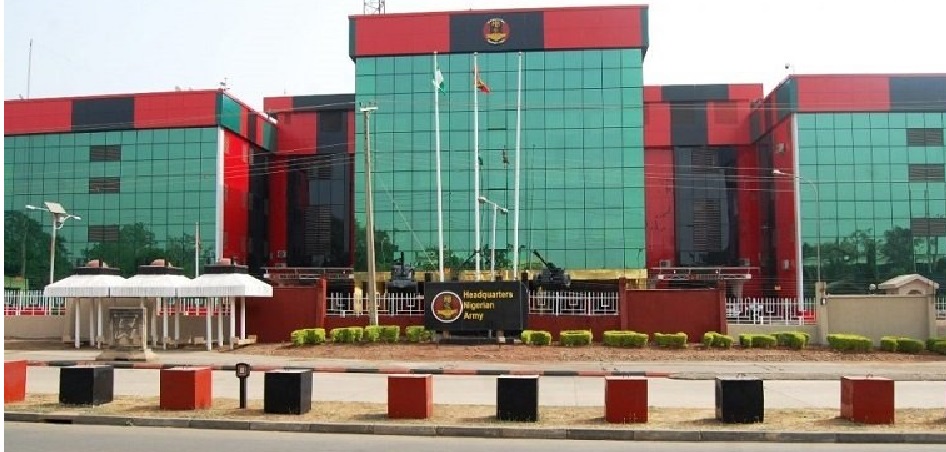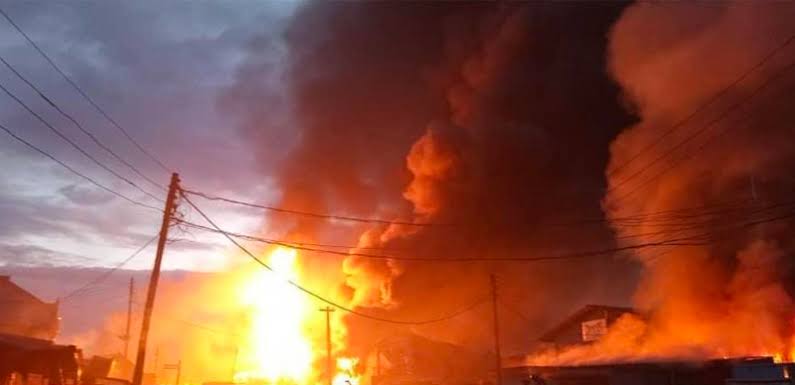News
DHQ to release bandits leaders’ names

There are indications that the Defence Headquarters (DHQ) is preparing to release the names and pictures of the new set of wanted terrorist and bandit leaders.
This was following the elimination of top terrorists and bandit leaders on the watchlist of the military and the emergence of a new crop of leaders.
The DHQ had in November 2022 declared no fewer than 19 bandit leaders wanted with a bounty of N5m on each of them to encourage Nigerians to volunteer information that could lead to their arrest.
Prominent among those declared wanted we’re Bello Turji from Fakai village, Zamfara State; Ali Kachalla, aka Ali Kawaje, from Kuyambara village in Danaadau Maru LG of Zamfara State; Ado Aliero, from Yankuzo village, in the Tsafe LGA, Zamfara State; Halilu Sububu from Sububu village, in the Maradun LGA, Zamfara State
Also on the list were Sani Dangote from Dumbarum village, Zurmi LGA of Zamfara State; Leko (Mozoj village, Mutazu LGA, Katsina State); Dogo Nahali (Yar Tsamiyar Jno village, Kankara LGA, Katsina State); Nagona from Angwan Galadima in the Isa Loa area of Sokoto State; Monore from Yantumaki village, Dan LGA, Katsina State; Gwaska Dankarami from Shamushele village in the Zuri LGA of Zamfara State; Baleri from Shinkafi LGA, Zamfara State and Mamudu Tainange from Varanda village in Batsari LGA, Katsina State and others.
A source said that the military was planning to release a new list of wanted terrorists.
The source noted that work was ongoing on that.
“The authorities are working on a new list of another wanted terrorist and bandit leaders. It will also contain their pictures. Their lists are being compiled.
“We will urge Nigerians to cooperate with us to enable us to neutralise them as we have done in the past. There should be a bounty on them but I can’t say how much. Don’t worry; it will be released to the public very soon,” the source hinted.
The Director, Defence Media Operations, Maj. Gen. Edward Buba, confirmed that work was ongoing on the new list.
“We are working on the list. It will be out soon,” he said.
Sunday PUNCH reports that the military had during several operations across the various theatres of operations killed many terrorist and bandit leaders.
This includes a notorious bandit kingpin identified as Boderi who allegedly orchestrated many high-profile kidnappings, including those of Yauri schoolgirls, Greenfield University, and the Nigerian Defence Academy attacks.
Boderi was said to have been killed alongside another kingpin, Bodejo in February 2024.
Between February 1 and 28, 2024, the troops killed 10 terrorist kingpins.
The terrorist kingpins are Ashiru, Kachambi, Dogon Rakumi, Sulen Nagala, Laushi, Bangis, Alhaji Kabiru, Alhaji Baldu, and Baban Yara.
In July 2023, a bandit leader in Zamfara, Dogo Gudali, was killed by the troops.
Similarly in January 2023, a bandit kingpin, popularly known as Alhaji Shadari, and some of his gang members were killed in Zamfara State.
News
SAD! Two d3ad as tanker explodes in Oyo

Two people, including the driver and motor boy, died when a tanker, suspected to be ladened with petroleum products, exploded in Ibadan, Oyo State capital.
The incident, which happened in the early hours of Tuesday at the New Garage area, Oluyole local government area of the city, has thrown the entire people in the neighborhood into a state of mourning.
Men of the Oyo State Fire Service, with the assistance of the security agencies, are battling hard to prevent the inferno from spreading to other commercial outlets and residential buildings.
News
UTME 2025: JAMB registers 1.6m candidates in 26 days

The Joint Admissions and Matriculation Board, JAMB, announced on Monday that 1,687,860 candidates have already registered for the 2025 Unified Tertiary Matriculation Examination, UTME.
The board stated in its weekly bulletin that registration has been ongoing for 26 days, beginning on 3rd February 2025, with just six days remaining before the deadline on 8th March.
The 2025 UTME is scheduled to take place from Friday, 18th April 2025.
JAMB had earlier projected two million candidates for the examination.
Providing a breakdown of the ongoing registration, JAMB disclosed that in the first week alone, 201,867 candidates registered. In the second week, the number rose to 560,025, followed by 528,832 in the third week. By the fourth week, the total had increased to 1,290,715.
The board reiterated in its bulletin that there would be no extension of the registration period beyond 8th March 2025.
A review of the immediate past UTME in 2024 showed that 1,989,668 candidates registered for the exam. Of these, 1,904,189 sat the examination, while 80,810 were absent.
A total of 1,402,490 candidates—73.7 per cent of those who sat the exam—scored below 200, while just 0.4 per cent achieved scores above 300.
News
Ramadan: Kebbi, Bauchi, Kano counter CAN, say schools stay closed

The Kebbi, Bauchi and Kano State governments have reaffirmed that the holiday granted to both primary and secondary schools in their states for Ramadan fast will not be reconsidered, despite concerns raised by the Christian Association of Nigeria.
Speaking with The PUNCH on Monday, the Chief Press Secretary to the Kebbi State governor, Ahmed Idris, stated that the decision was made after consulting all relevant stakeholders, including religious leaders and parents.
“We are not reversing the decision. The closure of the schools was a result of meetings with all relevant stakeholders, including religious leaders, parents, and others. The leadership of CAN and the Muslim community were carried along before the decision was reached,” Idris said.
He further explained that the closure would only affect a maximum of two weeks from the initial academic calendar, emphasising that it would not disrupt school activities.
“Our normal school calendar already factored in closures during the fasting period. So, the issue of disrupting the academic calendar does not arise,” he added.
Similarly, the Kano State Director of Public Enlightenment in the state’s Ministry of Education, Balarabe Kiru, said there is no reason why the state government would reverse the directive as the decision to close the schools was taken after a meeting with all relevant stakeholders.
“There was a stakeholders’ meeting at the federal level during which the Christian Association of Nigeria was fully represented.
“More so, members of the State Executive Council have also agreed on the academic calendar. So there is no way we can reverse the directive. There is no going back on the decision so far taken with the knowledge and agreement of all stakeholders and the State Executive Council,” Kiru said.
Also speaking with The PUNCH on Monday, the Bauchi State Commissioner for Education, Lawal Zayam, said the decision to close schools would not be reviewed.
According to him, the holiday was captured in the 2024/2025 academic calendar of the state long at the beginning of the session.
Zayam said, “We have not done anything extraordinary. Before we drafted the 2024/2025 session calendar, the stakeholders’ input was considered.
“The stakeholders were the ones who propel this solution, especially the private school owners whose state chairman is a Christian.
“This has nothing to do with our academic calendar because, after the resumption, the students will have two weeks of studies to complete their second term before moving on to the third term.”
Stressing that all relevant stakeholders were carried along, the commissioner added, “We equally consulted other states, which we have exchanged programmes with before a memo was raised for the calendar and got approved by the governor.”
However, CAN in the 19 northern states and Abuja, on Monday, condemned the school closures in Kebbi and other Shariah-practicing states, including Bauchi, Katsina, and Kano, where schools have been shut for five weeks.
In a statement issued in Kaduna, Northern CAN Chairman, Rev. John Joseph Hayab, expressed concern that the closures would negatively impact students preparing for crucial examinations, including the Unified Tertiary Matriculation Examination and Junior Secondary School exams.
“We are worried about these closures, especially considering the setbacks already faced by students in most northern states due to rising insecurity. The decision could further hinder educational progress,” Hayab said.
He also noted that many of the children affected by the closures are under 14 years old and may not yet be religiously mature enough to observe fasting.
“Additionally, the recent Multidimensional Poverty Index by the National Bureau of Statistics highlights the educational challenges in these states, with Bauchi at 54%, Kebbi at 45%, Katsina at 38%, and Kano at 35% of children lacking access to education,” he added.
Hayab pointed out that even in predominantly Islamic countries such as Saudi Arabia and the United Arab Emirates, schools remain open during Ramadan, urging northern governors to adopt a similar approach.
“Instead of shutting down schools, a better approach would be to reduce school hours, allowing students and teachers time to observe fasting without compromising education. We have consulted Islamic scholars, and they confirmed that these school closures are more about political expediency than religious necessity,” he argued.
Consequently, CAN called on northern governors to reconsider their stance and prioritise education.
“CAN Northern Nigeria, therefore, wishes to appeal to governors of northern Nigeria, especially those who are championing this kind of ill-advised idea, to stop presenting our region in a bad light and make people laugh at us as if we are unserious people.
“As a peace-loving organisation, CAN call on the people to remain calm and law-abiding and challenge stakeholders and well-meaning Nigerians to address the matter amicably.
“As peace-loving people, CAN in the 19 northern states and Abuja in solidarity with the statement released by the National President of CAN yesterday on this subject matter are calling on the people to remain calm and law-abiding and challenge stakeholders and well-meaning Nigerians to address the matter most amicably,” Hayab added.
Meanwhile, Yobe State has opted against school closures for Ramadan.
Although the state’s Ministry for Basic and Secondary Education has yet to make an official statement, a visit to Bukar Ali El-Kanemi Primary School in Damaturu revealed that classes were ongoing on Monday.
The proprietor of Sarki Musa Memorial Academy, Prof. Musa Tukur, confirmed that school hours had been adjusted to close at noon instead of 1:30 pm to accommodate fasting students, while Quranic classes were temporarily suspended.
Also, Kebbi State Governor, Nasir Idris, on Monday, approved the reduction of official working hours for the state civil servants in view of the Ramadan fasting.
The state’s Commissione for, Ministry for Establishment, Pension and Training, Awwal Manu Dogondaji, announced this in a statement on Monday.
The commissioner said: “The newly approved hours for the state civil servants from Monday to Thursday is now from 8a.m. to 1p.m while Friday is from 8a.m. to 12p.m.”
He added that the normal working hours would resume at the end of Ramadan period.
Manu Dogondaji urged people to remain steadfast in prayer for prevailing peace and stability in the state and Nigeria at large.
Credit: PUNCH
-

 News23 hours ago
News23 hours agoBREAKING! TInubu fires NYSC DG, announces fresh appointment
-

 News23 hours ago
News23 hours agoBreaking: Obasa is now LSHA Speaker, Meranda deputy
-

 News19 hours ago
News19 hours ago“My wife has tasted over 21 men in the movie industry-Comedian Ijoba laments
-

 Politics23 hours ago
Politics23 hours agoBREAKING: Ex- Lagos guber candidate Jandor dumps PDP
-

 News19 hours ago
News19 hours agoKano Hisbah nabs Muslims for eating in public during Ramadan
-

 News22 hours ago
News22 hours agoPalmpay Customer Panic – Before Opay Puts Me In Trouble
-

 News22 hours ago
News22 hours agoECOWAS Parliament Kicks Off First Extraordinary Session
-

 News19 hours ago
News19 hours agoBREAKING! TInubu endorses licences for eleven new private varsities






